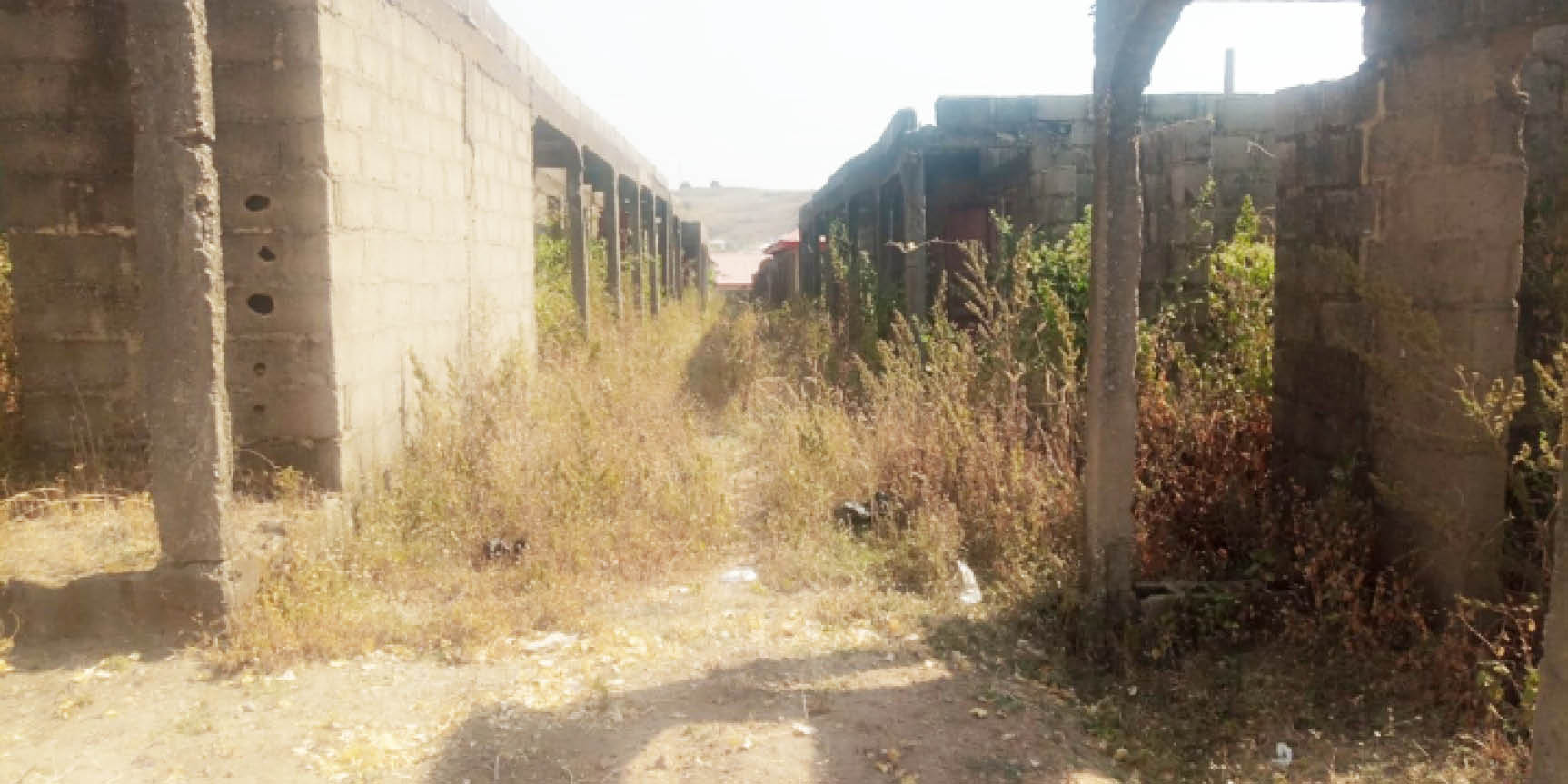The burden of abandoned projects
Abandoned projects are part of the unique features of our national landscape. We are not unused to the unsightly sight of abandoned road construction, uncompleted hospitals and other health projects, uncompleted classroom blocks and abandoned water projects. They are federal and state projects and litter the land everywhere. When our attention is occasionally drawn to […]

A section of the abandoned Auwal Ibrahim Modern Market in Suleja
Abandoned projects are part of the unique features of our national landscape. We are not unused to the unsightly sight of abandoned road construction, uncompleted hospitals and other health projects, uncompleted classroom blocks and abandoned water projects. They are federal and state projects and litter the land everywhere.
When our attention is occasionally drawn to them as TheGuardian newspaper did in its investigation report of abandoned projects in the south-west geo-political zone in its issue of May 17, we see a nation, not on the cusp of modern development but a confused and wasteful nation given to motion mistaken for movement. These abandoned projects are evidence, if any was needed, that much of our development plans are, to borrow from the musician, jaga-jaga, because they are largely contractor-driven, not policy driven.
TheGuardian reporters, Seyi Olumide and his colleagues, put their fingers on this blight on our development plans that under-develop us at national and sub-national levels, when they wrote, tongue in the cheek: “Were there to be an award for the world headquarters of abandoned projects, Nigeria would surely be a major contender for such an infamous prize. Reason: one administration after the other has perfected the cunning art of initiating all shades of projects but with no genuine intention of completing the same for the benefit of the long-suffering people.”
Nigeria must be the sole contender for such a dubious honour. No other country, developed or developing, has turned itself, as the reporters correctly wrote, into “one of the world’s biggest junkyards for abandoned projects worth billions of naira.” Each one of these abandoned projects was intended to move the nation from one point to another in its ambition to catch up with the rest of the world in physical and human development. Each of them raised the people’s hope for a better life but dashed it on the rock of abandonment. Each of the projects represents the wastefulness that has gradually become the culture among our political leaders at all levels. It is the reason why, to quote TheGuardian story, our nation is saddled with “gross infrastructure deficit, poor quality of life (and) decades of stunted growth.”
The Institute of Quantity Surveyors, according to TheGuardian, carried out research into abandoned projects nation-wide in 2022. Here is what the Institute found: 15,000 in the south-east, 11,000 in the south-south;10,000 in the south-west; 6,000 in the north-west, 7,000 in the north-central; 5,000 in the north-east and 2,000 in FCT. It also established that more than 10,000 of these projects were federal government projects left rotting away in the tropical sun. These figures do not paint a nation whose leaders take its development seriously. The cost of these abandoned projects run into trillions of naira, money that have could have a fundamental difference in the lives of our people condemned to struggle in the midst of plenty. Do no think that there will be any changes in how manage our affairs as a nation. This is a crippled nation.
Abandoned projects speak ill of the nation and its political leaders. It is their duty to conceive, initiate and undertake projects deemed to be in the interest of both the nation and its people. That duty cannot be properly discharged if we continue to treat the country or the state as a new birth under each new administration. What is happening is a huge shame on our leaders and the people whose ballot papers put them in their exalted political offices.
The giant of Africa is unable to rise to its full height as a giant. The giant of Africa is a sad story in the annals of human development and progress. No nation treats its development at national and sub-national levels as a personal project, initiated at the instance of contractors and abandoned by the combined failure of the contractor and his business comprador.
We can offer two reasons for the abandoned projects. The first, as you obviously can guess, is corruption which has turned our governments into unholy partnership with contractors who tell our rulers what so-called development projects to undertake. It is the easiest way to rob the people of their collective wealth. The stories you often hear of contractors not even knowing the sites of the development projects for which they were awarded huge and lucrative contracts are not fairy tales. They are facts, sad facts. Quite often the contract execution stops with the payment of the mobilisation fees to the contractors. The money is shared between the contractor and the contract giver and the project is abandoned. End of the story.
The second reason is that we continue to put into public offices men who are not prepared for leadership and, therefore, cannot plan, short or long term. If they cannot lead, they cannot appreciate why human development is a function of proper planning and cannot be driven by contractors.
The giant of Afric is the poverty capital of the world. It is also, without contest, the junkyard of abandoned projects in the world. It is painful. The sheer number of abandoned projects in all the geo-poetical zones boggle the mind. A nation so blessed by nature with enviable natural resources – liquid and solid mineral resources, 80 per cent arable land – ought not sink this low and be condemned to thrash about in the bog of arrested development. It is painful because it is a burden this nation should not and ought not to bear.
